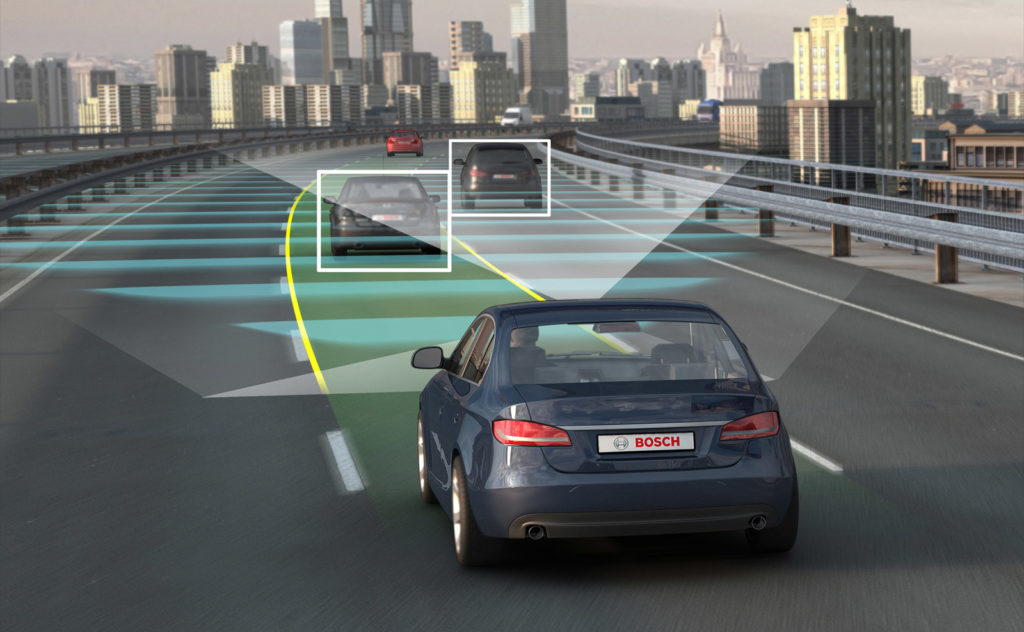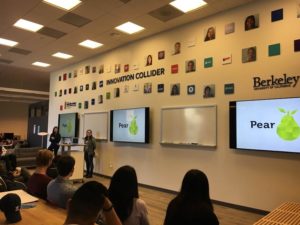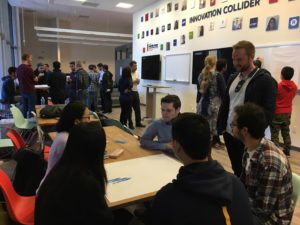
Imagine having seamless connectivity and driving without any traffic congestion. Imagine an intersection that warns you if there is a collision just seconds ahead. Whether a car is human operated or autonomous, sensing the environment from a car’s vantage point faces limitations because of occlusion by structures and other vehicles. With self-driving cars looming on the horizon, is it possible to use a network of sensors and cameras to augment the navigation of cars?

Sponsored by Bosch, advised by Pear VC and the Institute of Transportation Studies, the Designing Cities for Autonomous Vehicles Innovation Collider had their Kickoff event on Friday, January 27th, and is focused on opportunities in autonomous vehicles and smart cities. Cities have the opportunity to include sensors and cameras in areas with limited visibility to provide additional information to the vehicles in the vicinity and reduce the chances of a collision. Mar Hershenson, Founding Managing Partner at Pear VC, discussed that there is a great amount of accident fatalities everyday due to technology distractions in vehicles. Hershenson mentioned that, “self-driving cars are expected to reduce fatalities by 90%.” She discussed applications such as driver assist, traffic management, and parking management that could be incorporated. Smart cities and city sensors such as in-pavement traffic cameras, and parking occupancy could greatly assist in decreasing accident fatalities by taking away the chance of human error. Autonomous vehicles would also reduce traffic congestion, create efficiency, and even save consumers money by reducing their time on the road and fuel intake.
When autonomous vehicles and objects involved in the normal driving experience are embedded with IoT data, a new interactive driving experience will emerge. Martta Lystila, Sr. Manager, Business Development at Bosch Car Multimedia, discussed the different trends in the Automotive Space. The mission for her and her team is to funnel Silicon Valley innovation into Bosch Car Multimedia’s strategic product roadmap via innovation scouting and start-up partnerships. Lystila described the “Personal AI” in which the car becomes your daily companion or secretary. There could be personalized experiences in both a private or shared car. She mentioned that “After file sharing, e-commerce, and social media, the next generation of the Internet is connecting things and devices: the Internet of Things (IoT). We expect 14 billion connected devices by 2022.” Connecting devices results in data that open new insights, business models, and revenue streams. Private users of connected devices will see the new services enriching their relationships to the products, providing higher quality of life, comfort, and security. Pierre Maillot, Senior Technological Advisor for the Bosch Group, is focused on strategizing and implementing Bosch technologies in a smart community development in San Francisco. For the last 4 years, he has been a pioneer in the Bosch smart city initiative. Maillot discussed how it is possible to leverage the potential of IoT in urban environments.

The goal of this Collider Project is to develop a proof-of-concept prototype and a business model, in order to explore the viability of a network of city cameras or sensors. Such a network would augment autonomous car navigation from reducing accidents in blind intersections to optimizing traffic flow and parking. An important innovation in this project is the creation a self-sustaining business model that could monetize the sensors early on and not rely on massive initial capital or city budgets to deploy. This could also help speed up the adoption of autonomous vehicles in cities. This Collider is also a great opportunity for students to learn about autonomous vehicles and the latest innovations in transportation. During the Kickoff event, students had the chance to break out into groups and brainstorm. Students will present their pitches during Finals on March 29, 2017.
Advisors:
Karen Trapenberg Frick- Assistant Adjunct Professor, City & Regional Planning, UC Berkeley
Martta Lystila- Senior Manager, Business Development at Bosch Car Multimedia
Pierre Maillot- Senior Technological Advisor for the Bosch Group
Mar Hershenson- Founding Managing Partner at Pear VC
